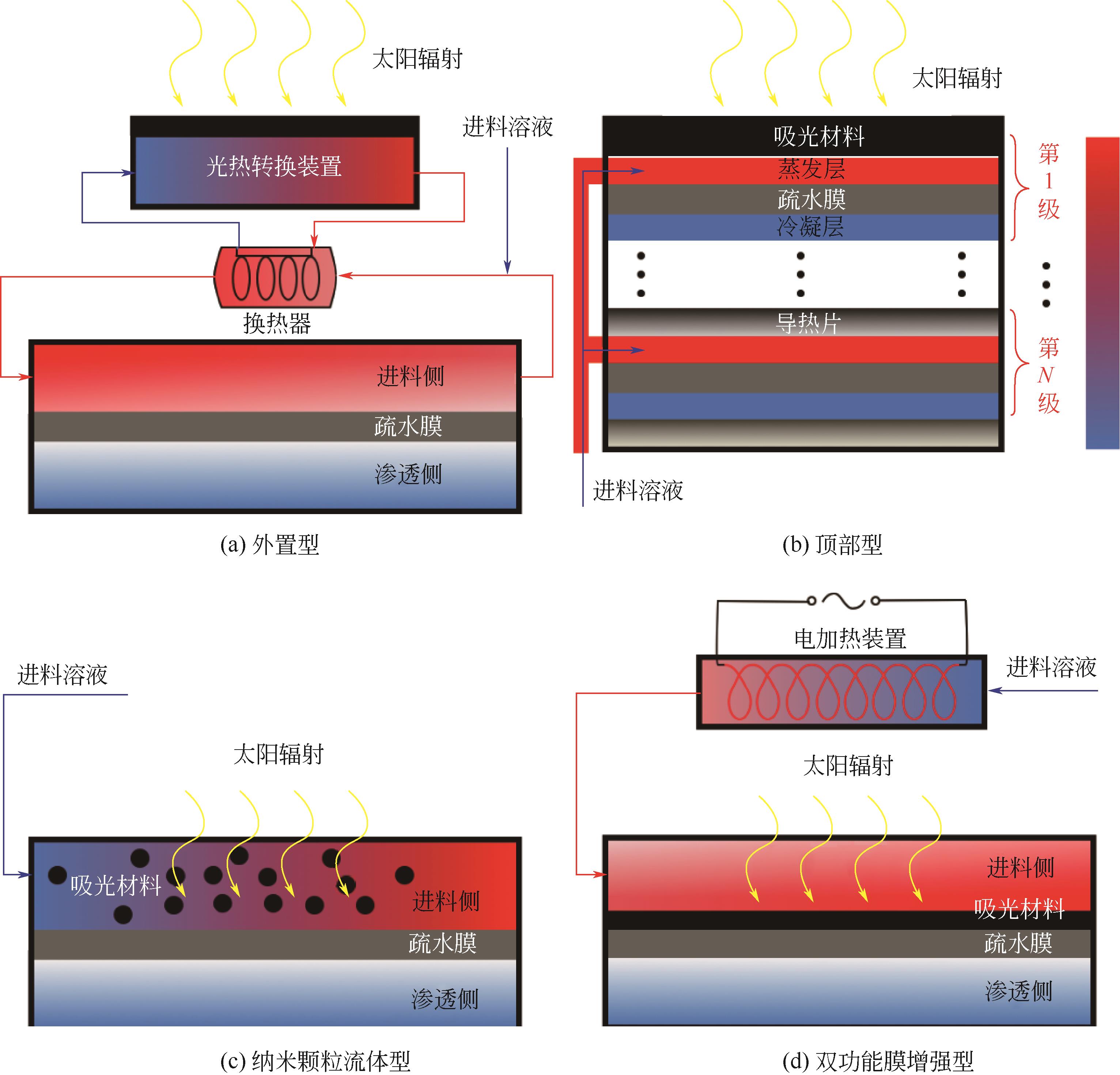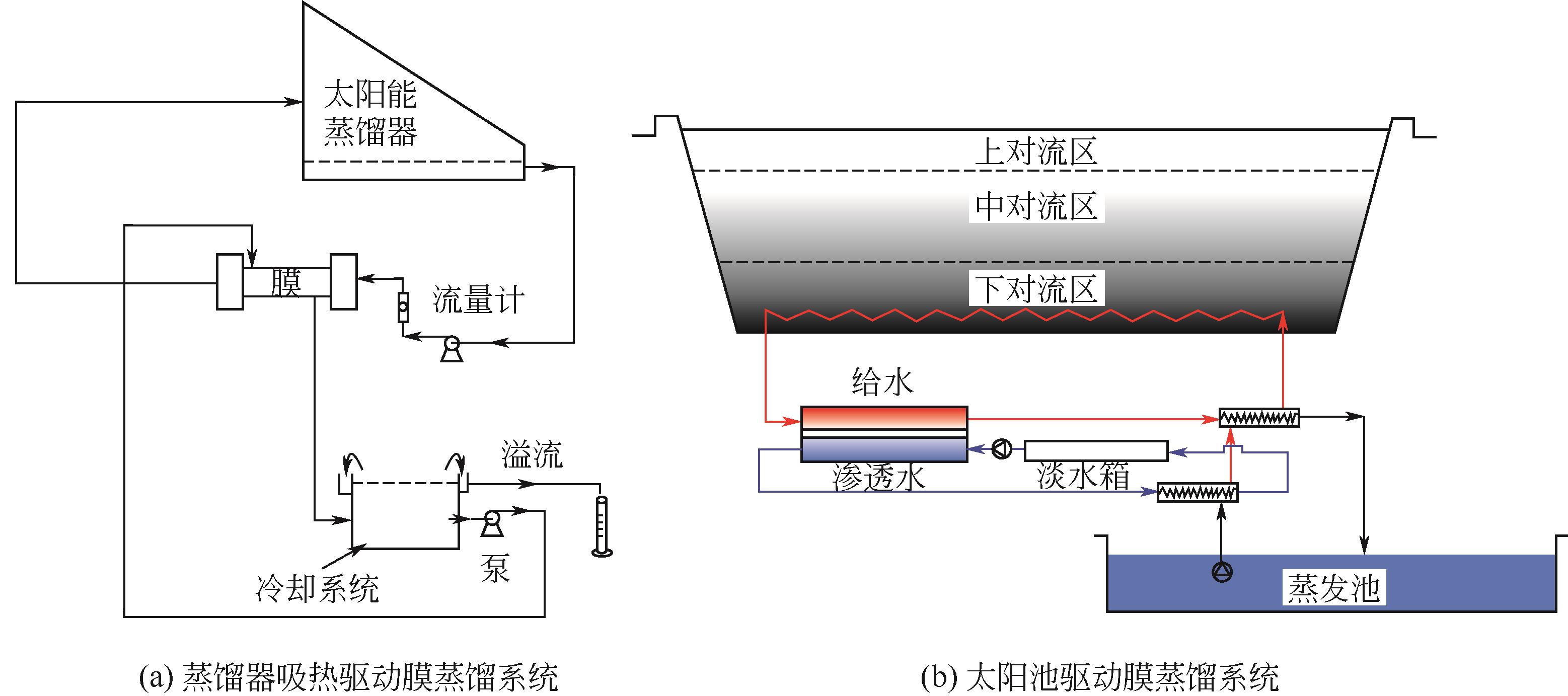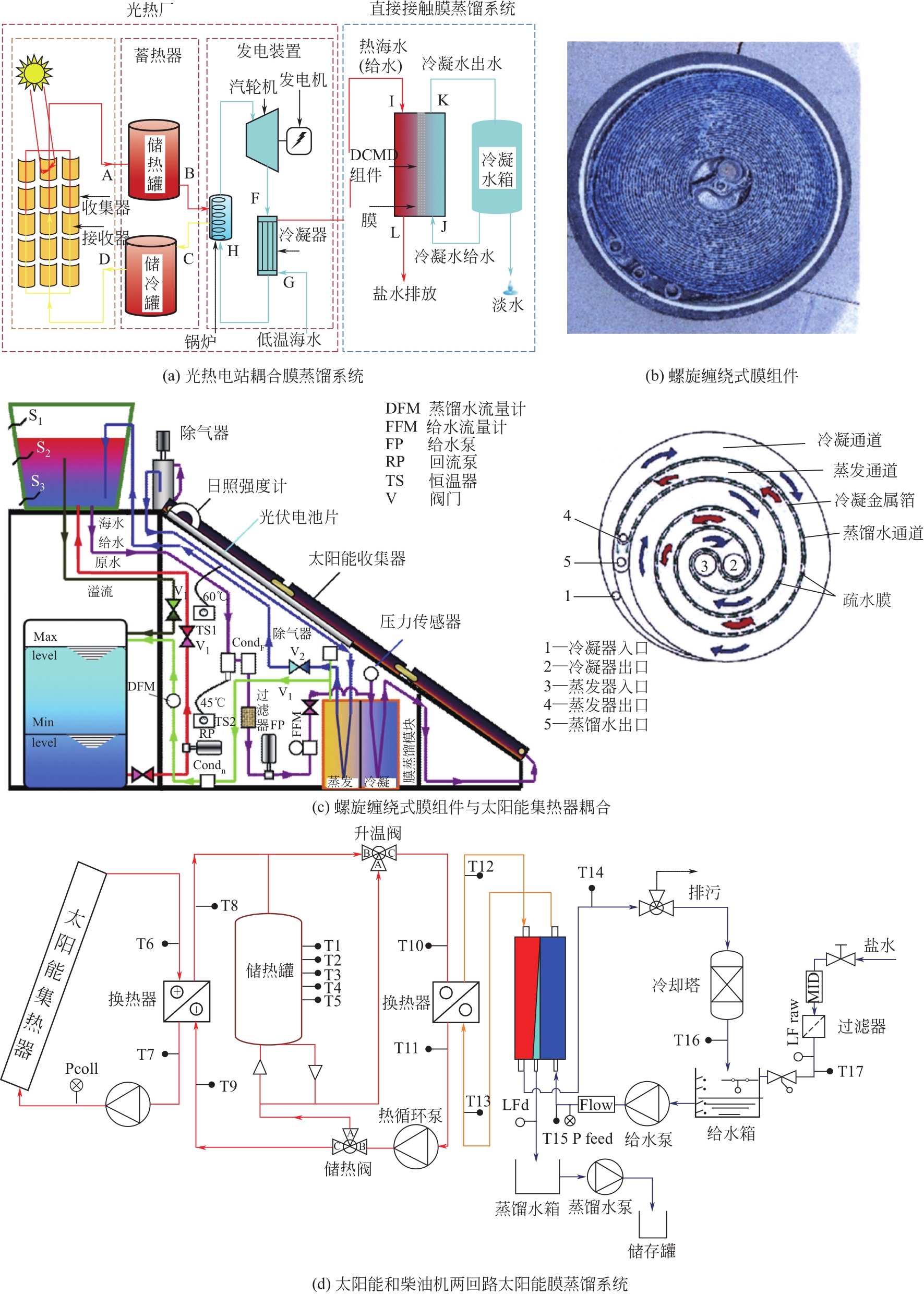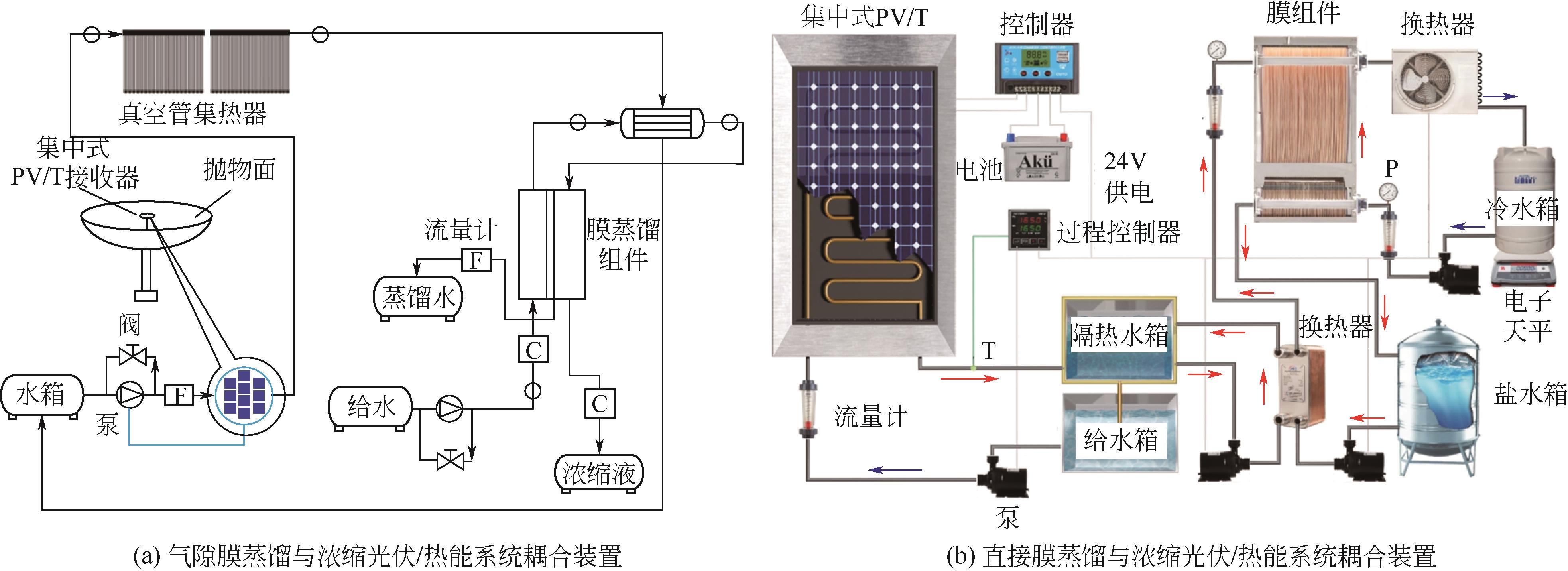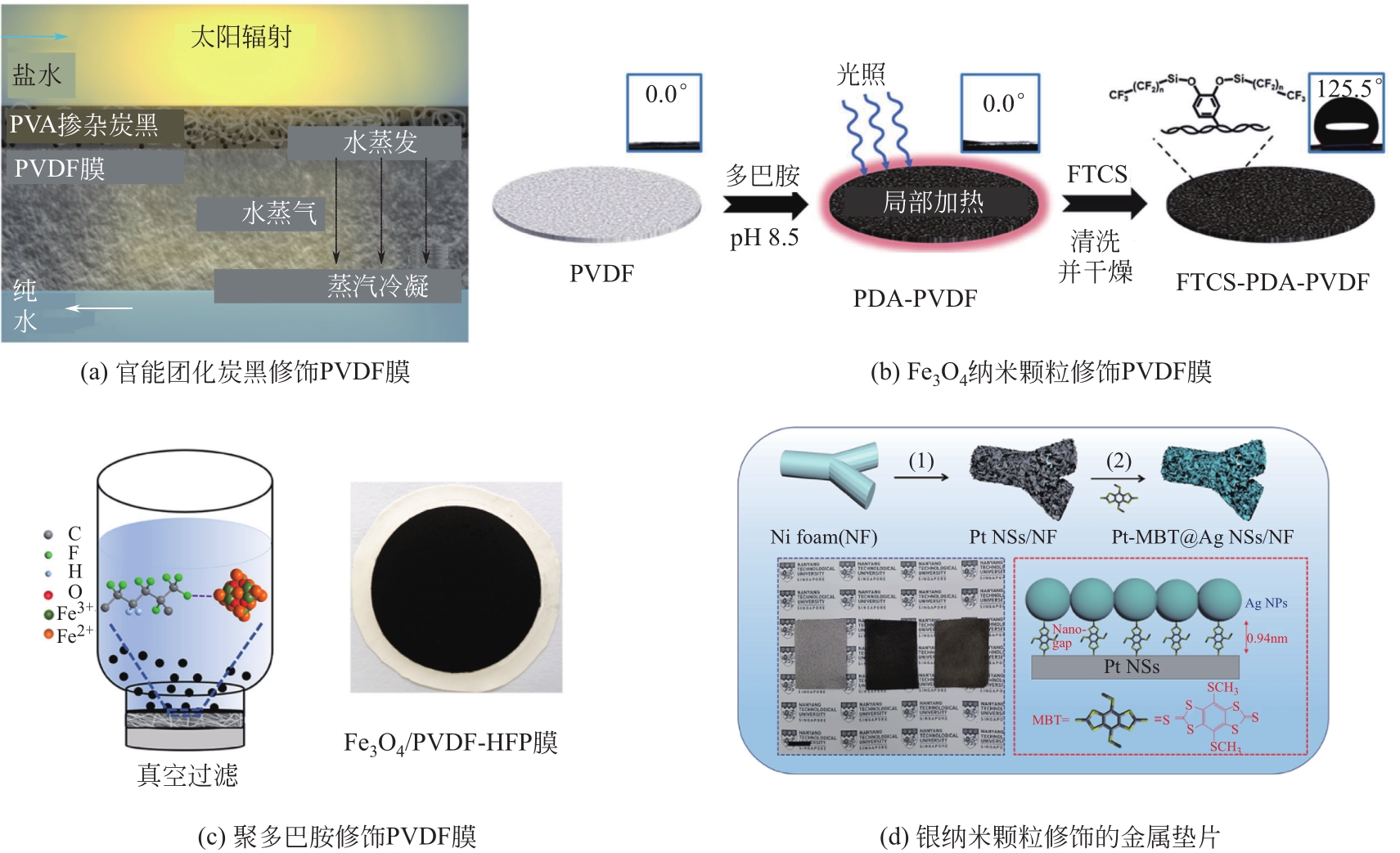Chemical Industry and Engineering Progress ›› 2021, Vol. 40 ›› Issue (10): 5403-5414.DOI: 10.16085/j.issn.1000-6613.2020-2050
• Chemical processes and equipment • Previous Articles Next Articles
Development and prospect of solar-driven membrane distillation system
LI Yihang( ), DAI Shaoling, YU Zhen, GU Ruonan, CHENG Shao’an(
), DAI Shaoling, YU Zhen, GU Ruonan, CHENG Shao’an( )
)
- State Key Laboratory of Clean Energy, Department of Energy Engineering, Zhejiang University, Hangzhou 310027, Zhejiang, China
-
Received:2020-10-12Revised:2021-01-05Online:2021-10-25Published:2021-10-10 -
Contact:CHENG Shao’an
太阳能膜蒸馏系统进展与展望
- 浙江大学能源清洁利用国家重点实验室,浙江 杭州 310027
-
通讯作者:成少安 -
作者简介:李逸航(1997—),男,硕士研究生,研究方向为太阳能水蒸发。E-mail:21927098@zju.edu.cn 。 -
基金资助:国家自然科学基金(51778562);国家重点研发计划(2018YFA0901300)
CLC Number:
Cite this article
LI Yihang, DAI Shaoling, YU Zhen, GU Ruonan, CHENG Shao’an. Development and prospect of solar-driven membrane distillation system[J]. Chemical Industry and Engineering Progress, 2021, 40(10): 5403-5414.
李逸航, 戴绍铃, 于桢, 顾若男, 成少安. 太阳能膜蒸馏系统进展与展望[J]. 化工进展, 2021, 40(10): 5403-5414.
share this article
Add to citation manager EndNote|Ris|BibTeX
URL: https://hgjz.cip.com.cn/EN/10.16085/j.issn.1000-6613.2020-2050
| 光热膜材料 | 涂覆方式 | LEP /pis | TPF /% | 光强 | NaCl浓度 | ηI /% | ηt /% | 平均淡水 产率 /kg·m-2·h-1 |
|---|---|---|---|---|---|---|---|---|
| PTFE-官能化炭黑[ | 黏合剂 | 60 | 0.09~1sun | 40g·L-1 | 0.55 | |||
| PVDF-炭黑[ | 蒸发涂层法 | 40 | 1.3sun | 1% | 74.6 | 2.7 | ||
| PVDF-官能化炭黑[ | 黏合剂+静电纺丝 | 17.5sun | 1% | 21 | 5.38 | |||
| PVDF-银纳米纤维[ | 非溶剂诱导的相转化工艺 | 104.3 | 104W·m-2紫外线 | 0.5mol·L-1 | 25.7 | |||
| PVDF-银纳米颗粒[ | 静电纺丝 | 22 | 0.32W·cm-2紫外线 | 3.5% | 8.5~25.7 | |||
| PTFE-氧化石墨烯/还原氧化石墨烯[ | 真空过滤 | 1sun | 4% | 0.72 | ||||
| PVDF-HFP-Fe3O4[ | 真空过滤 | 1sun | 3.5% | 53 | 0.97 | |||
| PVDF-掺锑的氧化锡(ATO)[ | 静电纺丝 | 22 | 116.1 | 100W红外辐射 | 3.5% | 27 | ||
| PVDF-银纳米颗粒[ | 0~0.7sun | 0.5mol·L-1 | — | 53 | 2.5~3.5 | |||
| 铂纳米片+泡沫镍[ | 热分解法 | 107 | 700000lx LED | 5g·L-1 | ||||
| PVDF-聚多巴胺(PDA)[ | 物理涂覆 | 0.75sun | 0.5mol·L-1 | 45 | 0.49 |
| 光热膜材料 | 涂覆方式 | LEP /pis | TPF /% | 光强 | NaCl浓度 | ηI /% | ηt /% | 平均淡水 产率 /kg·m-2·h-1 |
|---|---|---|---|---|---|---|---|---|
| PTFE-官能化炭黑[ | 黏合剂 | 60 | 0.09~1sun | 40g·L-1 | 0.55 | |||
| PVDF-炭黑[ | 蒸发涂层法 | 40 | 1.3sun | 1% | 74.6 | 2.7 | ||
| PVDF-官能化炭黑[ | 黏合剂+静电纺丝 | 17.5sun | 1% | 21 | 5.38 | |||
| PVDF-银纳米纤维[ | 非溶剂诱导的相转化工艺 | 104.3 | 104W·m-2紫外线 | 0.5mol·L-1 | 25.7 | |||
| PVDF-银纳米颗粒[ | 静电纺丝 | 22 | 0.32W·cm-2紫外线 | 3.5% | 8.5~25.7 | |||
| PTFE-氧化石墨烯/还原氧化石墨烯[ | 真空过滤 | 1sun | 4% | 0.72 | ||||
| PVDF-HFP-Fe3O4[ | 真空过滤 | 1sun | 3.5% | 53 | 0.97 | |||
| PVDF-掺锑的氧化锡(ATO)[ | 静电纺丝 | 22 | 116.1 | 100W红外辐射 | 3.5% | 27 | ||
| PVDF-银纳米颗粒[ | 0~0.7sun | 0.5mol·L-1 | — | 53 | 2.5~3.5 | |||
| 铂纳米片+泡沫镍[ | 热分解法 | 107 | 700000lx LED | 5g·L-1 | ||||
| PVDF-聚多巴胺(PDA)[ | 物理涂覆 | 0.75sun | 0.5mol·L-1 | 45 | 0.49 |
| 44 | LINIC S, ASLAM U, BOERIGTER C, et al. Photochemical transformations on plasmonic metal nanoparticles[J]. Nature Materials, 2015, 14(6): 567-576. |
| 45 | GONG Biyao, YANG Huachao, WU Shenghao, et al. Graphene array-based anti-fouling solar vapour gap membrane distillation with high energy efficiency[J]. Nano-Micro Letters, 2019, 11(1): 1-14. |
| 46 | HAN Dongxiao, MENG Zhaoguo, WU Daxiong, et al. Thermal properties of carbon black aqueous nanofluids for solar absorption[J]. Nanoscale Research Letters, 2011, 6: 457. |
| 47 | CHEN Xiaoling, MUNJIZA A, ZHANG Kai, et al. Molecular dynamics simulation of heat transfer from a gold nanoparticle to a water pool[J]. Journal of Physical Chemistry C, 2014, 118(2): 1285-1293. |
| 1 | SHANNON M A, BOHN P W, ELIMELECH M, et al. Science and technology for water purification in the coming decades[J]. Nature, 2008, 452(7185): 301-310. |
| 2 | HAO Dandan, YANG Yudi, XU Bi, et al. Bifunctional fabric with photothermal effect and photocatalysis for highly efficient clean water generation[J]. ACS Sustainable Chemistry & Engineering, 2018, 6(8): 10789-10797. |
| 48 | CHEN Meijie, HE Yurong, ZHU Jiaqi, et al. An experimental investigation on sunlight absorption characteristics of silver nanofluids[J]. Solar Energy, 2015, 115: 85-94. |
| 49 | POLITANO A, ARGURIO P, DI PROFIO G, et al. Photothermal membrane distillation for seawater desalination[J]. Advanced Materials, 2017, 29(2): 1603504. |
| 50 | DAI Zhen, LI Zhihua, LI Li, et al. Synthesis and thermal properties of antimony doped tin oxide/waterborne polyurethane nanocomposite films as heat insulating materials[J]. Polymers for Advanced Technologies, 2011, 22(12): 1905-1911. |
| 3 | HAILEMARIAM R H, Yun Chul WOO, DAMTIE M M, et al. Reverse osmosis membrane fabrication and modification technologies and future trends: a review[J]. Advances in Colloid and Interface Science, 2020, 276: 102100. |
| 4 | LEE Kah Peng, ARNOT T C, MATTIA D. A review of reverse osmosis membrane materials for desalination—Development to date and future potential[J]. Journal of Membrane Science, 2011, 370(1/2): 1-22. |
| 51 | Edison Huixiang ANG, TAN Yong Zen, CHEW Jia Wei. A three-dimensional plasmonic spacer enables highly efficient solar-enhanced membrane distillation of seawater[J]. Journal of Materials Chemistry A, 2019, 7(17): 10206-10211. |
| 52 | ZEINY A, JIN Haichuan, LIN Guiping, et al. Solar evaporation via nanofluids: a comparative study[J]. Renewable Energy, 2018, 122: 443-454. |
| 5 | KIM Sewoon, CHU Kyoung Hoon, AL-HAMADANI Y A J, et al. Removal of contaminants of emerging concern by membranes in water and wastewater: a review[J]. Chemical Engineering Journal, 2018, 335(9): 896-914. |
| 6 | QASIM M, BADRELZAMAN M, DARWISH N N, et al. Reverse osmosis desalination: a state-of-the-art review[J]. Desalination, 2019, 459(3): 59-104. |
| 7 | AL-OTHMAN A, TAWALBEH M, ASSAD M EL HAJ, et al. Novel multi-stage flash (MSF) desalination plant driven by parabolic trough collectors and a solar pond: a simulation study in UAE[J]. Desalination, 2018, 443(4): 237-244. |
| 8 | Henghua LÜ, WANG Yan, WU Lianying, et al. Numerical simulation and optimization of the flash chamber for multi-stage flash seawater desalination[J]. Desalination, 2019, 465(11): 69-78. |
| 9 | ZHANG Yonggang, PENG Yuelian, JI Shulan, et al. Review of thermal efficiency and heat recycling in membrane distillation processes[J]. Desalination, 2015, 367: 223-239. |
| 10 | ALKHUDHIRI A, DARWISH N, HILAL N. Membrane distillation: a comprehensive review[J]. Desalination, 2012, 287: 2-18. |
| 11 | ZHANG Jianhua, LI Junde, DUKE M, et al. Performance of asymmetric hollow fibre membranes in membrane distillation under various configurations and vacuum enhancement[J]. Journal of Membrane Science, 2010, 362(1): 517-528. |
| 12 | YANG Xing, WANG Rong, SHI Lei, et al. Performance improvement of PVDF hollow fiber-based membrane distillation process[J]. Journal of Membrane Science, 2011, 369(1): 437-447. |
| 13 | LAWSON K W, LLOYD D R. Membrane distillation[J]. Journal of Membrane Science, 1997, 124(1): 1-25. |
| 14 | ALKHUDHIRI A, DARWISH N, HILAL N. Produced water treatment: application of air gap membrane distillation[J]. Desalination, 2013, 309: 46-51. |
| 53 | LI Wenpeng, CHEN Yiqing, YAO Lei, et al. Fe3O4/PVDF-HFP photothermal membrane with in-situ heating for sustainable, stable and efficient pilot-scale solar-driven membrane distillation[J]. Desalination, 2020, 478(12): 114288. |
| 54 | YE Haohui, LI Xiong, DENG Li, et al. Silver nanoparticle-enabled photothermal nanofibrous membrane for light-driven membrane distillation[J]. Industrial and Engineering Chemistry Research, 2019, 58(8): 3269-3281. |
| 55 | ZHANG Yong, LIU Lie, LI Kuiling, et al. Enhancement of energy utilization using nanofluid in solar powered membrane distillation[J]. Chemosphere, 2018, 212: 554-562. |
| 56 | POLITANO A, DI PROFIO G, FONTANANOVA E, et al. Overcoming temperature polarization in membrane distillation by thermoplasmonic effects activated by Ag nanofillers in polymeric membranes[J]. Desalination, 2019, 451(2): 192-199. |
| 57 | HUANG Lu, PEI Junxian, JIANG Haifeng, et al. Water desalination under one sun using graphene-based material modified PTFE membrane[J]. Desalination, 2018, 442(12): 1-7. |
| 58 | HUANG Qinglin, GAO Shangpeng, HUANG Yan, et al. Study on photothermal PVDF/ATO nanofiber membrane and its membrane distillation performance[J]. Journal of Membrane Science, 2019, 582(3): 203-210. |
| 59 | WU Jinjian, ZODROW K R, SZEMRAJ P B, et al. Photothermal nanocomposite membranes for direct solar membrane distillation[J]. Journal of Materials Chemistry A, 2017, 5(45): 23712-23719. |
| 60 | DONGARE P D, ALABASTRI A, PEDERSEN S, et al. Nanophotonics-enabled solar membrane distillation for off-grid water purification[J]. Proceedings of the National Academy of Sciences of the United States of America, 2017, 114(27): 6936-6941. |
| 61 | SAID I A, WANG Sen, LI Qilin. Field demonstration of a nanophotonics-enabled solar membrane distillation reactor for desalination[J]. Industrial and Engineering Chemistry Research, 2019, 58(40): 18829-18835. |
| 62 | TAN Yong Zen, Edison Huixiang ANG, CHEW Jia Wei. Metallic spacers to enhance membrane distillation[J]. Journal of Membrane Science, 2019, 572(10): 171-183. |
| 63 | WU Xuanhao, JIANG Qisheng, GHIM D, et al. Localized heating with a photothermal polydopamine coating facilitates a novel membrane distillation process[J]. Journal of Materials Chemistry A, 2018, 6(39): 18799-18807. |
| 64 | GOSTOLI C, SARTI G C. Separation of liquid-mixtures by membrane distillation[J]. Journal of Membrane Science, 1989, 41: 211-224. |
| 65 | XU Zhenyuan, ZHANG Lenan, ZHAO Lin, et al. Ultrahigh-efficiency desalination: via a thermally-localized multistage solar still[J]. Energy and Environmental Science, 2020, 13(3): 830-839. |
| 66 | CHEN Meijie, HE Yurong, WANG Xinzhi, et al. Numerically investigating the optical properties of plasmonic metallic nanoparticles for effective solar absorption and heating[J]. Solar Energy, 2018, 161(10): 17-24. |
| 67 | HE Yurong, CHEN Meijie, WANG Xinzhi, et al. Plasmonic multi-thorny gold nanostructures for enhanced solar thermal conversion[J]. Solar Energy, 2018, 171(6): 73–82. |
| 68 | LIU Yanlan, AI Kelong, LIU Jianhua, et al. Dopamine-melanin colloidal nanospheres: an efficient near-infrared photothermal therapeutic agent for in vivo cancer therapy[J]. Advanced Materials, 2013, 25(9): 1353-1359. |
| 69 | BLACK K C, YI Ji, RIVERA J G, et al. Polydopamine-enabled surface functionalization of gold nanorods for cancer cell-targeted imaging and photothermal therapy[J]. Nanomedicine, 2013, 8(1): 17-28. |
| 70 | HONG Seonki, KIM Keum Yeon, WOOK Hwang Jin, et al. Attenuation of the in vivo toxicity of biomaterials by polydopamine surface modification[J]. Nanomedicine, 2011, 6(5): 793-801. |
| 71 | KU Sook Hee, Jungki RYU, HONG Seon Ki, et al. General functionalization route for cell adhesion on non-wetting surfaces[J]. Biomaterials, 2010, 31(9): 2535-2541. |
| 72 | JIANG Qisheng, DERAMI H G, GHIM D, et al. Polydopamine-filled bacterial nanocellulose as a biodegradable interfacial photothermal evaporator for highly efficient solar steam generation[J]. Journal of Materials Chemistry A, 2017, 5(35): 18397-18402. |
| 73 | SWAMINATHAN J, CHUNG Hyung Won, WARSINGER D M, et al. Energy efficiency of permeate gap and novel conductive gap membrane distillation[J]. Journal of Membrane Science, 2016, 502: 171-178. |
| 15 | SINGH D, PRAKASH P, SIRKAR K K. Deoiled produced water treatment using direct-contact membrane distillation[J]. Industrial & Engineering Chemistry Research, 2013, 52(37): 13439-13448. |
| 16 | BOUGUECHA S, HAMROUNI B, DHAHBI M. Small scale desalination pilots powered by renewable energy sources: case studies[J]. Desalination, 2005, 183(1): 151-165. |
| 17 | ALVES V D, COELHOSO I M. Orange juice concentration by osmotic evaporation and membrane distillation: a comparative study[J]. Journal of Food Engineering, 2006, 74(1): 125-133. |
| 18 | TOMASZEWSKA M, GRYTA M, MORAWSKI A W. Study on the concentration of acids by membrane distillation[J]. Journal of Membrane Science, 1995, 102: 113-122. |
| 19 | RIOYO J, ARAVINTHAN V, BUNDSCHUH J. The effect of "high-pH pretreatment” on RO concentrate minimization in a groundwater desalination facility using batch air gap membrane distillation[J]. Separation and Purification Technology, 2019, 227: 115699. |
| 20 | GARCÍA-PAYO M C, IZQUIERDO-GIL M A, FERNÁNDEZ-PINEDA C. Air gap membrane distillation of aqueous alcohol solutions[J]. Journal of Membrane Science, 2000, 169(1): 61-80. |
| 21 | NOOR I E, COENEN J, MARTIN A, et al. Performance assessment of chemical mechanical planarization wastewater treatment in nano-electronics industries using membrane distillation[J]. Separation and Purification Technology, 2020, 235: 116201. |
| 22 | LOUSSIF N, ORFI J. Comparative study of air gap, direct contact and sweeping gas membrane distillation configurations[J]. Membrane Water Treatment, 2016, 7(1): 71-86. |
| 23 | ZHAO Shuaifei, FERON P H M, XIE Zongli, et al. Condensation studies in membrane evaporation and sweeping gas membrane distillation[J]. Journal of Membrane Science, 2014, 462: 9-16. |
| 24 | SUK D E, MATSUURA T, PARK Ho Bum, et al. Development of novel surface modified phase inversion membranes having hydrophobic surface-modifying macromolecule (NSMM) for vacuum membrane distillation[J]. Desalination, 2010, 261(3): 300-312. |
| 25 | M A E-R ABU-ZEID, ZHANG Yaqin, DONG Hang, et al. A comprehensive review of vacuum membrane distillation technique[J]. Desalination, 2015, 356: 1-14. |
| 26 | FATH H E S, ELSHERBINY S M, HASSAN A A, et al. PV and thermally driven small-scale, stand-alone solar desalination systems with very low maintenance needs[J]. Desalination, 2008, 225(1/2/3): 58-69. |
| 27 | NAKOA K, RAHAOUI K, DATE A, et al. An experimental review on coupling of solar pond with membrane distillation[J]. Solar Energy, 2015, 119: 319-331. |
| 28 | TYAGI V V, KAUSHIK S C, TYAGI S K. Advancement in solar photovoltaic/thermal (PV/T) hybrid collector technology[J]. Renewable and Sustainable Energy Reviews, 2012, 16(3): 1383-1398. |
| 29 | SCHWANTES R, CIPOLLINA A, GROSS F, et al. Membrane distillation: solar and waste heat driven demonstration plants for desalination[J]. Desalination, 2013, 323: 93-106. |
| 30 | HUGHES A J, O’DONOVAN T S, MALLICK T K. Experimental evaluation of a membrane distillation system for integration with concentrated photovoltaic/thermal (CPV/T) energy[J]. Energy Procedia, 2014, 54: 725-733. |
| 31 | SOOMRO M I, KIM Woo-Seung. Parabolic-trough plant integrated with direct-contact membrane distillation system: concept, simulation, performance, and economic evaluation[J]. Solar Energy, 2018, 173(7): 348-361. |
| 32 | RALUY R G, SCHWANTES R, SUBIELA V J, et al. Operational experience of a solar membrane distillation demonstration plant in Pozo Izquierdo-Gran Canaria Island (Spain)[J]. Desalination, 2012, 290: 1-13. |
| 33 | BANAT F, JUMAH R, GARAIBEH M. Exploitation of solar energy collected by solar stills for desalination by membrane distillation[J]. Renewable Energy, 2002, 25(2): 293-305. |
| 34 | KALOGIROU S A. Use of TRYNSYS for modeling and simulation of a hybrid PV-thermal solarsys tem for cyprus[J]. Renewable Energy, 2001, 23: 247-260. |
| 35 | LI Guiqiang, SHITTU S, DIALLO T M O, et al. A review of solar photovoltaic-thermoelectric hybrid system for electricity generation[J]. Energy, 2018, 158: 41-58. |
| 36 | KOSCHIKOWSKI J, WIEGHAUS M, ROMMEL M, et al. Experimental investigations on solar driven stand-alone membrane distillation systems for remote areas[J]. Desalination, 2009, 248(1/2/3): 125-131. |
| 37 | AL-HRARI M, CEYLAN İ, NAKOA K, et al. Concentrated photovoltaic and thermal system application for fresh water production[J]. Applied Thermal Engineering, 2020, 171(7): 115054. |
| 38 | GUILLÉN-BURRIEZA E, BLANCO J, ZARAGOZA G, et al. Experimental analysis of an air gap membrane distillation solar desalination pilot system[J]. Journal of Membrane Science, 2011, 379(1/2): 386-396. |
| 39 | CHIAVAZZO E, MORCIANO M, VIGLINO F, et al. Passive solar high-yield seawater desalination by modular and low-cost distillation[J]. Nature Sustainability, 2018, 1(12): 763-772. |
| 40 | XUE Guobin, CHEN Qian, LIN Shizhe, et al. Highly efficient water harvesting with optimized solar thermal membrane distillation device[J]. Global Challenges, 2018, 2(5/6): 1800001. |
| 41 | HUANG Lu, JIANG Haifeng, WANG Yipu, et al. Enhanced water yield of solar desalination by thermal concentrated multistage distiller[J]. Desalination, 2020, 477(11): 114260. |
| 42 | WANG Wenbin, SHI Yusuf, ZHANG Chenlin, et al. Simultaneous production of fresh water and electricity via multistage solar photovoltaic membrane distillation[J]. Nature Communications, 2019, 10(1): 3012. |
| 43 | GAO Yi, YUAN Zhe, GAO Shiwu. Semiclassical approach to plasmon-electron coupling and landau damping of surface plasmons[J]. Journal of Chemical Physics, 2011, 134(13): 134702. |
| [1] | ZHANG Zuoqun, GAO Yang, BAI Chaojie, XUE Lixin. Thin-film nanocomposite (TFN) mixed matrix reverse osmosis (MMRO) membranes from secondary interface polymerization containing in situ grown ZIF-8 nano-particles [J]. Chemical Industry and Engineering Progress, 2023, 42(S1): 364-373. |
| [2] | ZHANG Fengqi, CUI Chengdong, BAO Xuewei, ZHU Weixuan, DONG Hongguang. Design and evaluation of sweetening process with amine solution absorption and multiple desorption [J]. Chemical Industry and Engineering Progress, 2023, 42(S1): 518-528. |
| [3] | SUN Yuyu, CAI Xinlei, TANG Jihai, HUANG Jingjing, HUANG Yiping, LIU Jie. Optimization and energy-saving of a reactive distillation process for the synthesis of methyl methacrylate [J]. Chemical Industry and Engineering Progress, 2023, 42(S1): 56-63. |
| [4] | LI Mengyuan, GUO Fan, LI Qunsheng. Simulation and optimization of the third and fourth distillation columns in the recovery section of polyvinyl alcohol production [J]. Chemical Industry and Engineering Progress, 2023, 42(S1): 113-123. |
| [5] | ZHANG Fan, TAO Shaohui, CHEN Yushi, XIANG Shuguang. Initializing distillation column simulation based on the improved constant heat transport model [J]. Chemical Industry and Engineering Progress, 2023, 42(9): 4550-4558. |
| [6] | LI Xuejia, LI Peng, LI Zhixia, JIN Dunshang, GUO Qiang, SONG Xufeng, SONG Peng, PENG Yuelian. Experimental comparation on anti-scaling and anti-wetting ability of hydrophilic and hydrophobic modified membranes [J]. Chemical Industry and Engineering Progress, 2023, 42(8): 4458-4464. |
| [7] | XU Jie, XIA Longbo, LUO Ping, ZOU Dong, ZHONG Zhaoxiang. Progress in preparation and application of omniphobic membranes for membrane distillation process [J]. Chemical Industry and Engineering Progress, 2023, 42(8): 3943-3955. |
| [8] | YE Zhendong, LIU Han, LYU Jing, ZHANG Yaning, LIU Hongzhi. Optimization of thermochemical energy storage reactor based on calcium and magnesium binary salt hydrates [J]. Chemical Industry and Engineering Progress, 2023, 42(8): 4307-4314. |
| [9] | LI Jiyan, JING Yanju, XING Guoyu, LIU Meichen, LONG Yong, ZHU Zhaoqi. Research progress and challenges of salt-resistant solar-driven interface photo-thermal materials and evaporator [J]. Chemical Industry and Engineering Progress, 2023, 42(7): 3611-3622. |
| [10] | ZHOU Lei, SUN Xiaoyan, TAO Shaohui, CHEN Yushi, XIANG Shuguang. Development and application of refinery short-cut column model [J]. Chemical Industry and Engineering Progress, 2023, 42(6): 2819-2827. |
| [11] | CHEN Weiliang, GAO Xin, LI Hong, LI Xingang. Influence mechanism of skeleton structure of foamed SiC corrugated structured packing on the mass transfer performance [J]. Chemical Industry and Engineering Progress, 2023, 42(5): 2289-2297. |
| [12] | FU Shurong, WANG Lina, WANG Dongwei, LIU Rui, ZHANG Xiaohui, MA Zhanwei. Oxygen evolution cocatalyst enhancing the photoanode performances for photoelectrochemical water splitting [J]. Chemical Industry and Engineering Progress, 2023, 42(5): 2353-2370. |
| [13] | WANG Dong, YU Pinhua, CHEN Bin, XIAO Ang, CHEN Feng, JIANG Yangyang. Energy saving optimization of cyclohexane three-effect distillation in cyclohexanone production [J]. Chemical Industry and Engineering Progress, 2023, 42(5): 2245-2251. |
| [14] | ZHANG Lele, QIAN Yundong, ZHU Huatong, FENG Silong, YANG Xiuna, YU Ying, YANG Qiang, LU Hao. Study on optimization limits of dehydration and desalination pretreatment of hydrogenated coal tar [J]. Chemical Industry and Engineering Progress, 2023, 42(5): 2298-2305. |
| [15] | ZONG Yue, ZHANG Ruijun, GAO Shanshan, TIAN Jiayu. A review on the pressure-driven thin film composite (TFC) membranes with special stability for desalination [J]. Chemical Industry and Engineering Progress, 2023, 42(4): 2058-2067. |
| Viewed | ||||||
|
Full text |
|
|||||
|
Abstract |
|
|||||

